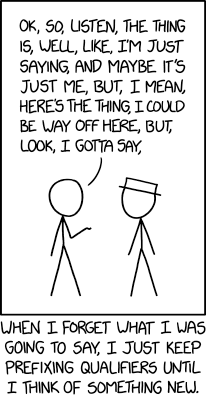Qualifying fluency
« previous post | next post »
The current xkcd:

Mouseover title: "[20 minutes later] ", hi.""
I'm not sure that there are 20 minutes worth of additional "qualifiers" beyond those given in the cartoon, though there are certainly plenty left off of that list: you know, really, yeah, seems like, believe it or not, apparently, sort of, … And there isn't a bright line between pure "qualifiers" (if any exist) and more contentful ways of framing a message or adjusting its impact, like "It's hard to believe this, but …", or "Recently I noticed…". Our president is fond of "Many people are saying …".
In the less contentful direction, as the cartoon's caption suggests, the listed words and phrases are not only qualifiers, they're also (one of the types of) fillers. Which in turn are considered to be one of the types of dysfluency (or disfluency).
And as I suggested in "Dysfluency considered harmful" (5/19/2019), the thing is, I gotta say, all of the many types of dysfluency have a double life. They might be symptoms of a breakdown in the flow of communication, signaling a problem in planning or execution. Or they might be an intrinsic part of the communicated message, contributing to its meaning like any other words and phrases. Or they might be something in between.
That's why I suggested that in linguistic discourse, the terms dysfluency and disfluency ought in most cases to be replaced by a more neutral word, such as interpolation.
GH said,
June 4, 2019 @ 7:55 am
I'm reminded of Fred Armisen's "Nicholas Fehn" character on SNL, where after a bit of setup he would launch into an improvised monologue of such qualifiers (and other prefatory comments), constantly interrupting himself so that he never actually says anything substantive.
"You… I know you, and I wish… look, I'm your friend, and I think… look, half the people here… I… there… look, I truly believe that, at best… well, my parents, there was a time, that there were… don't you think if we all, if everyone here… sir, sir, sir…. ma'am… you two, the both of you…" etc.
Walter said,
June 4, 2019 @ 8:28 am
I was also reminded of Sir Humphrey:
"Well Minister, if you ask me for a straight answer, then I shall say that, as far as we can see, looking at it by and large, taking one thing with another in terms of the average of departments, then in the final analysis it is probably true to say, that at the end of the day, in general terms, you would probably find that, not to put too fine a point on it, there probably wasn't very much in it one way or the other. As far as one can see, at this stage."
Victor Mair said,
June 4, 2019 @ 8:37 am
Japanese intellectual discourse is possessed of rich resources in this regard.
Steve Jones said,
June 4, 2019 @ 9:55 am
Cf. the All-Purpose Opening Speech by the great Flann O'Brien: "this was to be one endless sentence, grammatically correct, and so devoid of meaning that it could be used on any conceivable occasion."
https://stephenjones.blog/2017/03/31/a-major-contribution-to-civilization/
Jerry Friedman said,
June 4, 2019 @ 12:13 pm
Basically!
I'm reminded of one of my physics professors in grad school. If someone asked him a question in class, he would start with would start with more or less grammatical combinations of physics buzzwords and then without warning make a transition to a cogent and helpful answer.
Though I don't listen to NPR news every day, I wouldn't mind if none of their reporters said "Here's the thing" any more this year.
John Shutt said,
June 5, 2019 @ 8:13 am
I'm somewhat put in mind of an interlude in Tom Lehrer's /The Physical Revue/.
Student: May I ask a question, sir?
Instructor: Certainly.
Student: Well, would you say that a relativistic approach to the nonsynthetic aspects of Newtonian mechanics is useful in formulating a comprehensive ontology for the metaphysical ramifications of empirical manifestations?
Instructor: Uh… No.
Student: Well, what /would/ you say?
Instructor: I would say, that a relativistic approach to the nonsynthetic aspects of Newtonian is *not* useful in formulating a comprehensive ontology for the metaphysical ramifications of empirical manifestations.
Andrew Usher said,
June 6, 2019 @ 7:31 am
Yes! I remember that too, it's one of the best moments there. I always took it to mean the instructor was cleverly telling the student his question was BS; but I suppose it could also being showing laziness. Perhaps both were intended.
k_over_hbarc at yahoo dot com
DWalker07 said,
June 6, 2019 @ 12:18 pm
Yesterday, on the radio, one commentator kept saying "Look, …." and "At the end of the day", and something else that I forget. Maybe "The thing is…"
It bothers me when someone keeps prefacing a statement with "Look, …" as if he or she is trying to insist that I pay extra attention to what they are saying. Maybe they need an extra veneer of authenticity, but after a while, it gets annoying (more so when you start noticing it, and it keeps happening).
Bloix said,
June 6, 2019 @ 3:39 pm
Obama often started answers with "Look." I don't like it – it feels like mild bullying.